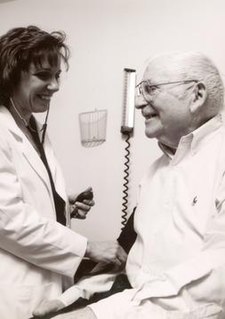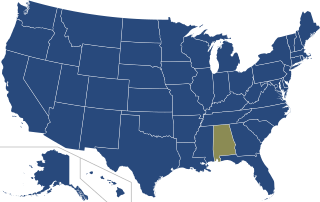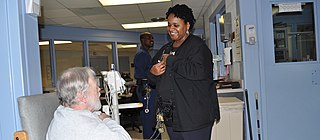
A physician, medical practitioner, medical doctor, or simply doctor, is a professional who practices medicine, which is concerned with promoting, maintaining or restoring health through the study, diagnosis, prognosis and treatment of disease, injury, and other physical and mental impairments. Physicians may focus their practice on certain disease categories, types of patients, and methods of treatment—known as specialities—or they may assume responsibility for the provision of continuing and comprehensive medical care to individuals, families, and communities—known as general practice. Medical practice properly requires both a detailed knowledge of the academic disciplines, such as anatomy and physiology, underlying diseases and their treatment—the science of medicine—and also a decent competence in its applied practice—the art or craft of medicine.
Osteopathic medicine is a branch of the medical profession in the United States that promotes the practice of allopathic medicine with a set of philosophy and principles set by its earlier form, osteopathy. Osteopathic physicians (DOs) are licensed to practice medicine and surgery in all 50 US states. Only graduates of American osteopathic medical colleges may practice the full scope of medicine and surgery generally considered to be medicine by the general public; US DO graduates have historically applied for medical licensure in 87 countries outside of the United States, 85 of who provided them with full scope of medical and surgical practice. The field is distinct from osteopathic practices offered in nations outside of the U.S., whose practitioners are generally not considered part of core medical staff nor of medicine itself. The other major branch of medicine in the United States is referred to by practitioners of osteopathic medicine as allopathic medicine.
A physician assistant or physician associate (PA) is a type of mid-level health care provider. PAs may diagnose illnesses, develop and manage treatment plans, prescribe medications, and may serve as a principal healthcare provider. PAs are required in nearly all states to have a direct agreement with a physician for supervision and collaboration.

The American College of Physicians (ACP) is a national organization of internists, who specialize in the diagnosis, treatment, and care of adults. With 154,000 members, ACP is the largest medical-specialty organization and second-largest physician group in the United States, after the American Medical Association. Its flagship journal, the Annals of Internal Medicine, is considered one of the five top medical journals in the United States and Britain.

A primary care physician (PCP) is a physician who provides both the first contact for a person with an undiagnosed health concern as well as continuing care of varied medical conditions, not limited by cause, organ system, or diagnosis. The term is primarily used in the United States. In the past, the equivalent term was 'general practitioner' in the US; however in the United Kingdom and other countries the term general practitioner is still used.

Medical education is education related to the practice of being a medical practitioner, including the initial training to become a physician and additional training thereafter.
A medical specialty is a branch of medical practice that is focused on a defined group of patients, diseases, skills, or philosophy. Examples include children (paediatrics), cancer (oncology), laboratory medicine (pathology), or primary care. After completing medical school, physicians or surgeons usually further their medical education in a specific specialty of medicine by completing a multiple-year residency to become a specialist.
The American Board of Internal Medicine (ABIM) is a 501(c)(3) nonprofit, self-appointed physician-evaluation organization that certifies physicians practicing internal medicine and its subspecialties. The American Board of Internal Medicine is not a membership society, educational institution, or licensing body.

Clinical pharmacy is the branch of pharmacy in which clinical pharmacists provide direct patient care that optimizes the use of medication and promotes health, wellness, and disease prevention. Clinical pharmacists care for patients in all health care settings but the clinical pharmacy movement initially began inside hospitals and clinics. Clinical pharmacists often work in collaboration with physicians, physician assistants, nurse practitioners, and other healthcare professionals. Clinical pharmacists can enter into a formal collaborative practice agreement with another healthcare provider, generally one or more physicians, that allows pharmacists to prescribe medications and order laboratory tests.
Maintenance of Certification (MOC) is a recently implemented and controversial process of physician certification maintenance through one of the 24 approved medical specialty boards of the American Board of Medical Specialties (ABMS) and the 18 approved medical specialty boards of the American Osteopathic Association (AOA). The MOC process is controversial within the medical community, with proponents claiming that it is a voluntary program that improves physician knowledge and demonstrates a commitment to lifelong learning. Critics claim that MOC is an expensive, burdensome, involuntary and clinically irrelevant process that has been created primarily as a money-making scheme for the ABMS and the AOA.

The National Physicians Alliance (NPA) was a 501(c)(3) national, multi-specialty medical organization founded in 2005. The organization's mission statement was: "The National Physicians Alliance creates research and education programs that promote health and foster active engagement of physicians with their communities to achieve high quality, affordable health care for all. The NPA offers a professional home to physicians across medical specialties who share a commitment to professional integrity and health justice." In 2019, they merged with Doctors for America.
Lifestyle medicine is a branch of medicine focused on preventive healthcare and self-care dealing with research, prevention, and treatment of disorders caused by lifestyle factors and preventable causes of death such as nutrition, physical inactivity, chronic stress, and self-destructive behaviors including the consumption of tobacco products and drug or alcohol abuse.
Clinical peer review, also known as medical peer review is the process by which health care professionals, including those in nursing and pharmacy, evaluate each other's clinical performance. A discipline-specific process may be referenced accordingly.

Prison healthcare is the medical specialty in which healthcare providers care for people in prisons and jails. Prison healthcare is a relatively new specialty that developed alongside the adaption of prisons into modern disciplinary institutions. Enclosed prison populations are particularly vulnerable to infectious diseases, including arthritis, asthma, hypertension, cervical cancer, hepatitis, tuberculosis, AIDS, and HIV, and mental health issues, such as Depression, mania, anxiety, and post-traumatic stress disorder. These conditions link prison healthcare to issues of public health, preventive healthcare, and hygiene. Prisoner dependency on provided healthcare raises unique problems in medical ethics.
Andrew A. Skolnick is an American science and medical journalist and photographer best known for his investigative reporting on health care issues, alternative medicine, and paranormal claims.

Choosing Wisely is a United States-based health educational campaign, led by the ABIM Foundation, about unnecessary health care.
Health care quality is a level of value provided by any health care resource, as determined by some measurement. As with quality in other fields, it is an assessment of whether something is good enough and whether it is suitable for its purpose. The goal of health care is to provide medical resources of high quality to all who need them; that is, to ensure good quality of life, cure illnesses when possible, to extend life expectancy, and so on. Researchers use a variety of quality measures to attempt to determine health care quality, including counts of a therapy's reduction or lessening of diseases identified by medical diagnosis, a decrease in the number of risk factors which people have following preventive care, or a survey of health indicators in a population who are accessing certain kinds of care.

A collaborative practice agreement (CPA) is a legal document in the United States that establishes a legal relationship between clinical pharmacists and collaborating physicians that allows for pharmacists to participate in collaborative drug therapy management (CDTM).

Correctional nursing, sometimes called forensic nursing, is a specialized field of nursing that involves caring for the medical and mental health needs of detainees and inmates. These nurses work in a variety of settings such as jails, prisons, and juvenile detention centers. In these correctional settings, nurses are the primary healthcare providers. These nurses also work with victims and assist in expert witness testimonies and are involved in a variety of legal cases including paternity disputes and workplace injuries.
A teaching hospital is a hospital or medical centre that provides medical education and training to future and current health professionals. Teaching hospitals are almost always affiliated with one or more universities and are often co-located with medical schools.









